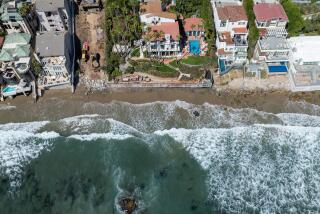Notes about your surroundings.
- Share via
Terns Return--California least terns have come back to nest at Bolsa Chica and other local spots, and they are “doing really well,” according to biologist Esther Burkett of the state Department of Fish and Game.
The endangered gull-like birds, which lay their eggs on the sand, had built 21 nests on Bolsa Chica’s south island by the first week in May, 42 by the second week and 80 by last week. Last season, there were 115 nests at Bolsa Chica. Least terns have also started nesting at Anaheim Bay, in Upper Newport Bay and on Huntington Beach (in a fenced area of the sand near the Santa Ana River mouth).
One good sign, according to Cal State Long Beach biologist Pat Baird, is that the birds are laying two to three eggs per nest, an indication of abundant food supplies. In poor food seasons, terns may lay only one or two eggs.
Outside the county, a least tern colony at the south end of Camp Pendleton near Oceanside is doing very well, according to Baird. In fact, the colony is attracting some birds that normally nest at Bolsa Chica and other local colonies.
Last season, the first since restoration of the 17-acre Talbert Marsh near the Huntington Beach colony, least terns were seen feeding in the wetland’s tidal waters. But so far this year, they don’t appear to be using the marsh; construction to widen the Santa Ana River channel may be driving the birds away, Baird believes.
Meanwhile, back at Bolsa Chica, this is the first season that the least terns have not nested on the reserve’s north island, finally having been pushed off by larger terns--namely Caspian and elegant--that have been nesting there in recent years as they expand their range northward.
Finally, about 70 black skimmers (a relative of the least tern) have been counted at Bolsa Chica but have not yet started to nest. About half the resident skimmers were oiled in February’s American Trader oil spill; while they survived, it is uncertain whether the problem will affect their nesting success. Some studies have shown that oil ingestion can lead to defective eggs.
Researchers thought the spill “probably wouldn’t affect their nesting,” Burkett said, because “they had enough time to ingest the oil before nesting.”
Dolphin Talk--Dennis Kelly of Orange Coast College will speak Thursday at the monthly meeting of the American Cetacean Society’s Orange County chapter. Kelly has coordinated extensive research into dolphins living off the Southern California coast.
The talk is free and will be held at 7:30 p.m. in the Costa Mesa Neighborhood Community Center, 1845 Park St. Call (714) 651-1825 for more information.
More to Read
Sign up for The Wild
We’ll help you find the best places to hike, bike and run, as well as the perfect silent spots for meditation and yoga.
You may occasionally receive promotional content from the Los Angeles Times.






